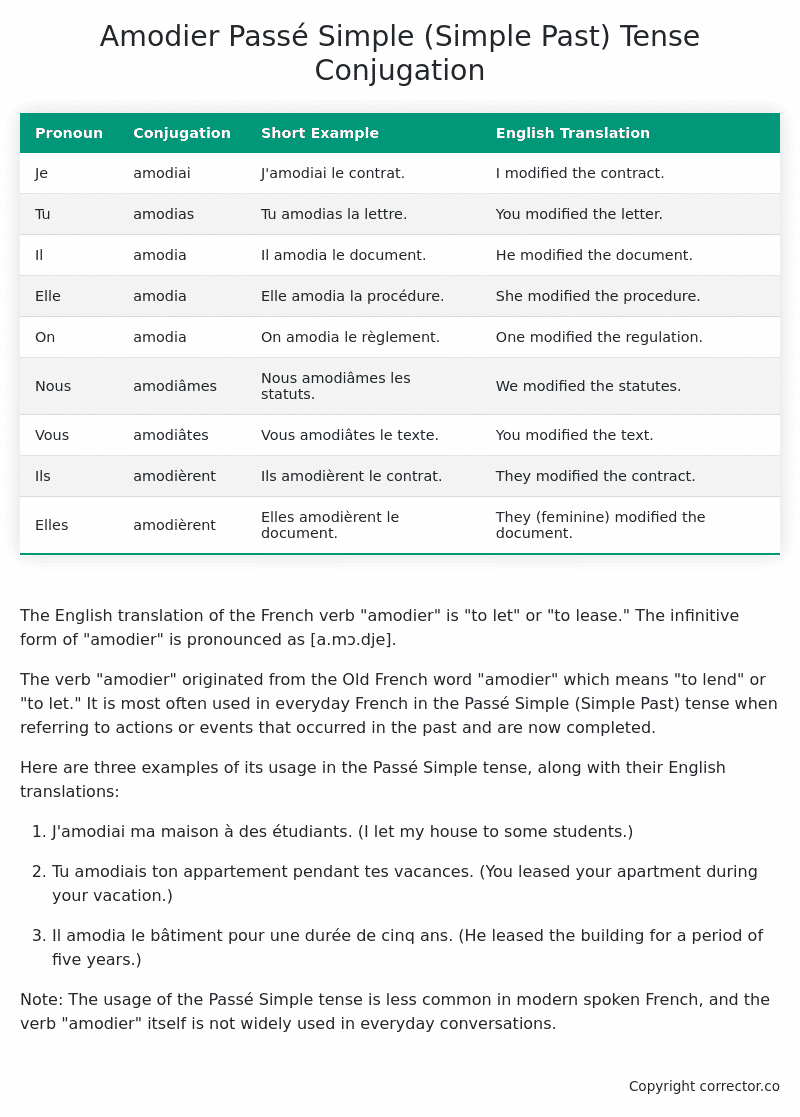Passé Simple (Simple Past) Tense Conjugation of the French Verb amodier
Introduction to the verb amodier
The English translation of the French verb “amodier” is “to let” or “to lease.” The infinitive form of “amodier” is pronounced as [a.mɔ.dje].
The verb “amodier” originated from the Old French word “amodier” which means “to lend” or “to let.” It is most often used in everyday French in the Passé Simple (Simple Past) tense when referring to actions or events that occurred in the past and are now completed.
Here are three examples of its usage in the Passé Simple tense, along with their English translations:
-
J’amodiai ma maison à des étudiants.
(I let my house to some students.) -
Tu amodiais ton appartement pendant tes vacances.
(You leased your apartment during your vacation.) -
Il amodia le bâtiment pour une durée de cinq ans.
(He leased the building for a period of five years.)
Note: The usage of the Passé Simple tense is less common in modern spoken French, and the verb “amodier” itself is not widely used in everyday conversations.
Table of the Passé Simple (Simple Past) Tense Conjugation of amodier
| Pronoun | Conjugation | Short Example | English Translation |
|---|---|---|---|
| Je | amodiai | J’amodiai le contrat. | I modified the contract. |
| Tu | amodias | Tu amodias la lettre. | You modified the letter. |
| Il | amodia | Il amodia le document. | He modified the document. |
| Elle | amodia | Elle amodia la procédure. | She modified the procedure. |
| On | amodia | On amodia le règlement. | One modified the regulation. |
| Nous | amodiâmes | Nous amodiâmes les statuts. | We modified the statutes. |
| Vous | amodiâtes | Vous amodiâtes le texte. | You modified the text. |
| Ils | amodièrent | Ils amodièrent le contrat. | They modified the contract. |
| Elles | amodièrent | Elles amodièrent le document. | They (feminine) modified the document. |
Other Conjugations for Amodier.
Le Present (Present Tense) Conjugation of the French Verb amodier
Imparfait (Imperfect) Tense Conjugation of the French Verb amodier
Passé Simple (Simple Past) Tense Conjugation of the French Verb amodier (You’re reading it right now!)
Passé Composé (Present Perfect) Tense Conjugation of the French Verb amodier
Futur Simple (Simple Future) Tense Conjugation of the French Verb amodier
Futur Proche (Near Future) Tense Conjugation of the French Verb amodier
Plus-que-parfait (Pluperfect) Tense Conjugation of the French Verb amodier
Passé Antérieur (Past Anterior) Tense Conjugation of the French Verb amodier
Futur Antérieur (Future Anterior) Tense Conjugation of the French Verb amodier
Subjonctif Présent (Subjunctive Present) Tense Conjugation of the French Verb amodier
Subjonctif Passé (Subjunctive Past) Tense Conjugation of the French Verb amodier
Subjonctif Imparfait (Subjunctive Imperfect) Tense Conjugation of the French Verb amodier
Subjonctif Plus-que-parfait (Subjunctive Pluperfect) Tense Conjugation of the French Verb amodier
Conditionnel Présent (Conditional Present) Tense Conjugation of the French Verb amodier
Conditionnel Passé (Conditional Past) Tense Conjugation of the French Verb amodier
Conditionnel Passé II (Conditional Past II) Tense Conjugation of the French Verb amodier
L’impératif Présent (Imperative Present) Tense Conjugation of the French Verb amodier
L’impératif Passé (Imperative Past) Tense Conjugation of the French Verb amodier
L’infinitif Présent (Infinitive Present) Tense Conjugation of the French Verb amodier
L’infinitif Passé (Infinitive Past) Tense Conjugation of the French Verb amodier
Le Participe Présent (Present Participle) Tense Conjugation of the French Verb amodier
Le Participe Passé (Past Participle) Tense Conjugation of the French Verb amodier
Struggling with French verbs or the language in general? Why not use our free French Grammar Checker – no registration required!
Get a FREE Download Study Sheet of this Conjugation 🔥
Simply right click the image below, click “save image” and get your free reference for the amodier Passé Simple tense conjugation!

Amodier – About the French Passé Simple (Simple Past) Tense
Formation
Usage
Narration
Historical Context
Interactions with other tenses
Passé Composé
Imparfait
Conditional and Subjunctive
Summary
I hope you enjoyed this article on the verb amodier. Still in a learning mood? Check out another TOTALLY random French verb conjugation!


